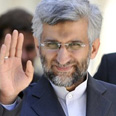
Iran says to enter Geneva talks with good intentions
Ahead of October 1 talks with six world powers, Islamic Republic's chief nuclear negotiator Saeed Jalili says upcoming meeting an 'opportunity and test' for world powers. Meanwhile, MP Ghafourifard threatens Iran may withdraw from NPT 'if things go from bad to worse'
Iran is entering talks with six world powers this week with good intentions, the Islamic Republic's chief nuclear negotiator said on Wednesday as he left Tehran for the one-day meeting in Geneva.
Saeed Jalili, echoing comments by other Iranian officials in the run-up to Thursday's discussions - the first since US President Barack Obama took office, described the meeting as an "opportunity and a test" for the world powers.
"We are entering the talks with good will," he said at Tehran's international Imam Khomeini airport. Jalili is secretary of the Supreme National Security Council.
The United States and its Western allies have made clear they will focus on Iran's disputed nuclear program, which they suspect is aimed at making bombs, at the October 1. talks.
Iran, which says it needs nuclear technology to generate electricity, has offered wide-ranging talks on security and other issues, but repeatedly ruled out any discussions about its nuclear "rights".
The United States, Russia, China, Britain, France and Germany will also take part in the Geneva meeting.
"Iran's national, regional and international capacities ... could be an opportunity for creating a world based upon peace, justice and progress," Jalili said.
Washington has suggested possible new sanctions on banking and the oil and gas industry if Iran, the world's fifth-largest crude exporter, fails to assuage Western fears it seeks nuclear weapons.
Nuclear treaty warning
On Tuesday, an Iranian MP, Mohammad Karamirad, was quoted as saying parliament may advocate Iran's withdrawal from the nuclear Non-Proliferation Treaty (NPT) if talks with big powers fail and the United States keeps putting pressure on Tehran.
Another MP, Hassan Ghafourifard, made similar remarks in an interview carried by state Press TV on Wednesday.
"If the P5+1 (six powers) continues to talk with us with the language of force to push us into a corner, and to talk about more sanctions, there might be no choice but to step out of the talks," Press TV's website quoted Ghafourifard as saying.
"If things go from bad to worse, then we might take more action on that ... like withdrawing from the NPT," he said.
Parliament can formally oblige the government to take such a step, as happened when Iran stopped permitting wide-ranging snap UN nuclear inspections in 2006, but Supreme Leader Ayatollah Ali Khamenei has final say on matters of state.
Top Iranian officials have repeatedly said Tehran has no intention to leave the NPT, under which its nuclear facilities are subject to regular UN nuclear watchdog inspections, or seek nuclear weapons it says violate the tenets of Islam.
Strategic analysts believe Iran would think twice before quitting the NPT since such a move would betray nuclear weapons ambitions and could provoke pre-emptive attack by Israel and possibly the United States.















